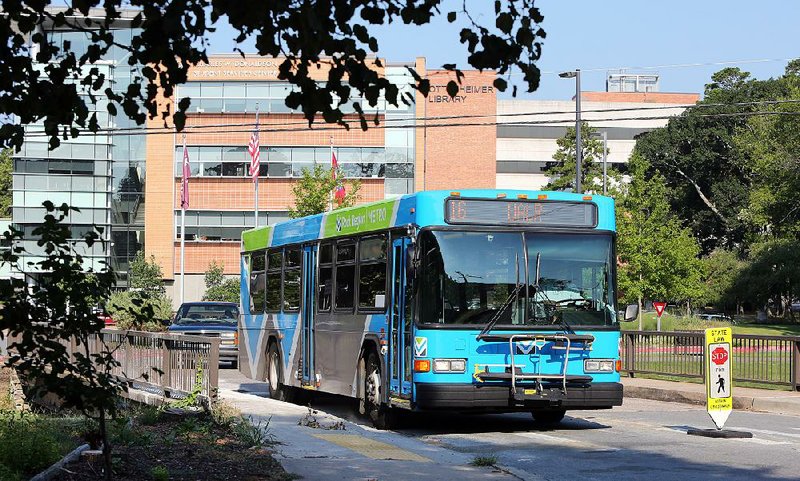The Great Resignation, the economic trend in which millions of Americans have quit their jobs en masse, includes Rock Region Metro bus drivers.
The number of drivers who operate the large buses on the Pulaski County transit agency's regular routes has fallen 20% since the covid-19 pandemic began about two years ago.
Around the nation, transit agencies have cut routes or service to cope with similar shortages, brought on by an aging workforce and the stress of the pandemic and resulting protocols for bus drivers and other front-line workers.
"This is a nationwide challenge," said Becca Green, the spokeswoman for Rock Region Metro.
Rock Region's workforce includes 84 drivers, down from the 105 it had before the pandemic, according to Green.
On the surface, the bus driver shortage hasn't affected operations because passengers have been slow to return to Rock Region.
During the worst of the pandemic, the number of passengers permitted on buses was limited to allow for social distancing. That limit has been dropped, but passengers and drivers are required by federal rules to wear masks and are encouraged to be vaccinated, Green said.
The regular bus routes saw 103,952 passenger trips last month, according to statistics provided by Justin Avery, Rock Region's interim chief executive officer.
The number was a modest improvement from the 91,260 passenger trips in January 2021. But last month's total was a little more than half of the 199,535 passenger trips that Rock Region saw in January 2020, before the pandemic began.
"It will take some time to get back up to pre-pandemic levels," Avery told members of the transit agency's board at a meeting last week.
But the lack of drivers does prevent the agency from implementing changes that are designed to attract more riders, according to Green.
The changes are encapsulated in Rock Region's R.I.D.E. 2020 plan. When the plan is implemented, underperforming bus routes will be dropped. Some of them will be replaced with microtransit zones, which use smaller vehicles to provide on-demand service.
Those changes would allow Rock Region to expand service hours for remaining weekly and weekend bus service and increase stop frequency to 30 minutes for most routes.
Both Little Rock and North Little Rock would get new cross-town transfers, which eliminate the need to go downtown to make a transfer. Little Rock would have a new transfer point at West Markham and Cedar and Pine streets, and North Little Rock would have one at Pershing Boulevard and Willow Street.
R.I.D.E. 2020 -- its letters an acronym for Route Innovation, Development and Evaluation -- was crafted under a $300,000 contract with Transportation Management & Design Inc., a San Diego consulting firm specializing in mass transit.
In addition to expanded service hours on weekdays and weekends, more frequent stops and additional microtransit zones, service will be simplified, more direct and faster, and it will extend bus service on Chenal Parkway to the Promenade at Chenal, according to the firm.
During the week, some routes will run an additional hour, to 9 p.m., and Saturday service will run an additional two hours, to 6 p.m. Both weekday and Saturday service start at 5 a.m.
Sunday service will also be expanded, going from 8 a.m. to 7 p.m., according to the plan. It currently runs from 9 a.m. to 4 p.m.
To fully implement the plan, Rock Region needs more drivers.
"Before the pandemic, we had 105 fixed route operators; we currently have 84, and, to launch the service changes that have been delayed due to the pandemic, we need 108 fixed route operators," Green said.
Where did the drivers go? According to Green, many opted for retirement.
"There are several factors contributing to the METRO's hiring challenge," she said. "The pandemic onset happened to coincide with our 34th year of existence as an agency, which has coincided with the retirement age of some of our most tenured fixed route operators; we've lost a few tenured operators to retirement in the last two years."
Green also cited a tight labor market, "especially when it comes to people who have or desire to have a commercial driver's license, and despite having the highest paid fixed-route bus operators in the state and an excellent benefit package, [Rock Region] is a public agency competing with private-sector employers, including Arkansas' robust trucking industry, for operators, and it could be that some prospective employees are being lured to that side of the driving industry."
The agency is holding a series of job fairs in an effort to fill its vacancies, and it's offering bonuses of up to $5,000 if a qualified applicant already holds a commercial driver's license.
The most recent job fair, held Feb. 11, netted 14 confirmed offers for drivers on the agency's regular bus routes, according to Green.
"That said, our numbers will probably be in flux for some time until we get closer to the target hiring number, as, once an offer is accepted, our recruits must meet additional requirements to become a [driver], such as passing a criminal background check and drug screening, as well as a Department of Transportation physical," she said.
For any applicant who doesn't have a commercial driver's license, the agency helps with training, but "the person must pass a written exam and obtain a CDL" before Rock Region can hire the person, Green said.
The next job fair will be from 9 a.m. to noon March 5 at Rock Region's main office at 900 S. Maple St. in North Little Rock. Prospective applicants also can schedule an appointment with human resources via humanresources@rrmetro.org or by calling (501) 375-6717, ext. 1264.
Sandra Profit, president of Local 704 of the Amalgamated Transit Union, which represents bus drivers and other workers at Rock Region Metro, didn't return phone calls for comment.
